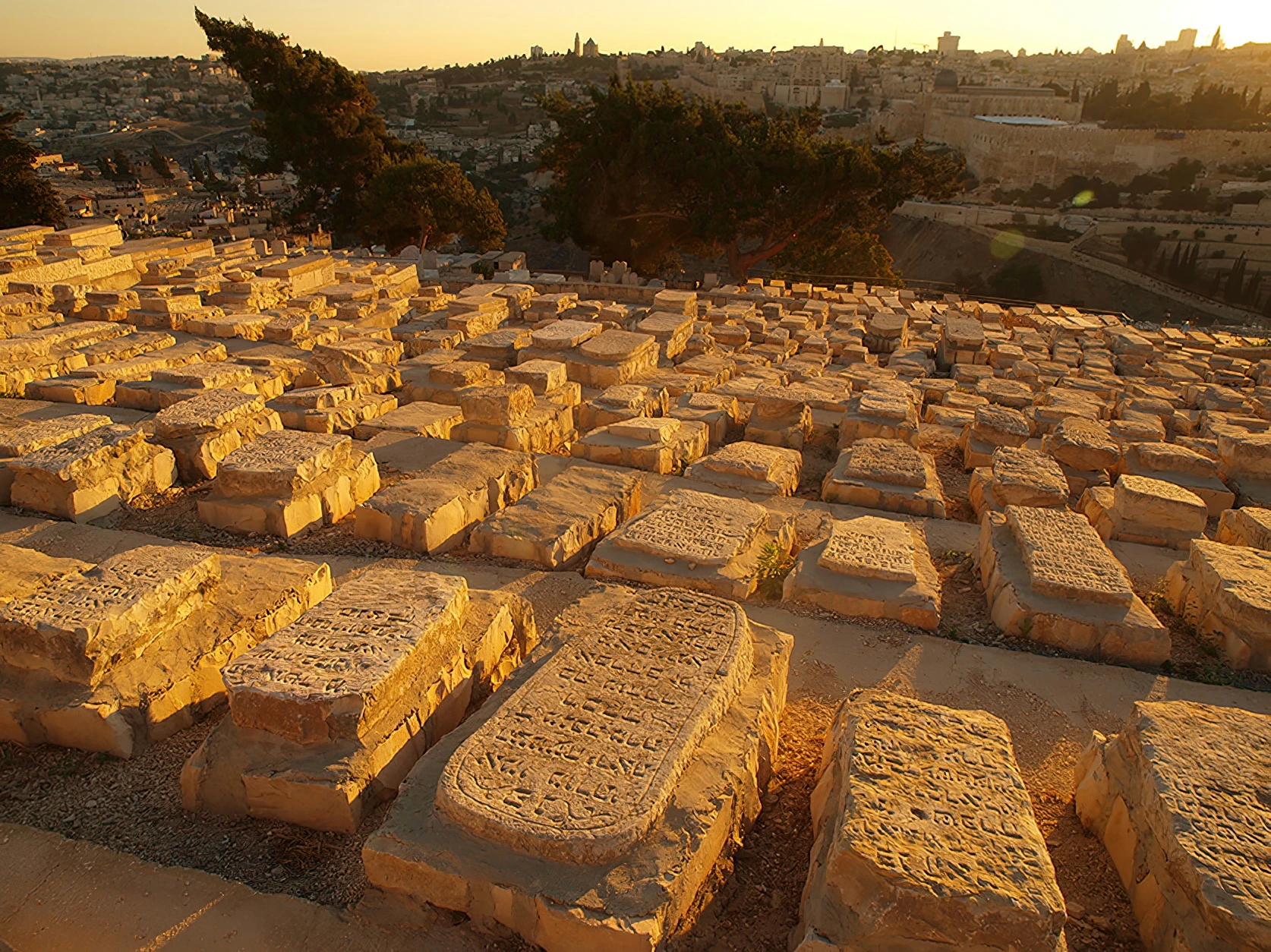Basics of Emunah #27: Satmar Rebbe & Chassidus; Divine Punishment; Trump & Iran
Q & A: When Your Child Chooses Another Path; When Judaism Is a Source of Stress; What Is Hell?
2 hr 48 min
The Satmar Rebbe, Rabbi Yoel Teitelbaum (1887-1979)
The Emunah Series
- May 10, 2018
- |
- 25 Iyyar 5778
Rabbi YY Jacobson
7480 views- 28Comment
- Call-in
Listen to the class on the phone
Call +1 (845) 201-1933
When prompted, dial the ID number below.
5501 MP3 MP4 - Copy Embed
Dedicated by Reb Mendel Zilberberg shlita
Dedicated in the honor of Yitzchk ben Blima, for a complete and speedy recovery
Class Summary:
Questions and Answers: The Satmar Rebbe & Chassidus; When Your Child Chooses Another Path; When Judaism Is a Source of Stress & Agony; Divine Punishment; Trump and Iran
Categories
The Emunah Series
Rabbi YY Jacobson
- May 10, 2018
- |
- 25 Iyyar 5778
- |
- 7480 views
Dedicated by Reb Mendel Zilberberg shlita
Dedicated in the honor of Yitzchk ben Blima, for a complete and speedy recovery
Classes in this Series
Please help us continue our work
Sign up to receive latest content by Rabbi YY
Join our WhatsApp Community
Join our WhatsApp Community















Please leave your comment below!
yosef jacobson -6 years ago
clothes
I have really, really missed the emunah series all these months and am awaiting its resumption with great anticipation.
There was something I thought of regarding the young man who wrote to you asking why all frum Jews dress the same, inferring that in the goyishe world, people dress individualistically.
I once heard Rabbi Refson of Neve Yerushalayim say that he was once on an airplane where his seatmate had a Mohawk haircut. Rabbi Refson, who is quite outspoken, asked him why he wore his hair that way. The young man replied, I want to look different. Rabbi R: I just came from London and there were hundreds of young people wearing this haircut. Young man: That’s because they also want to look different.
How anyone with eyes in his head can say that in our world we all dress the same and in the secular world not is beyond me. They all dress in the same jeans and t shirt. On wall street they all wear the same suit, tie, shoes, coat, etc. Where do you find a more nonsensical form of apparel than ripped jeans? Who ever, outside of the Bowery, would be caught dead dressed like that as recently as 30 years ago? But some celebrity or other picks up the “style” from a designer schooled in the art of Emperor’s New Clothes fashion, and everyone in the secular world wears it, and happily pays for it.
Well, I finally got that off my chest.
Reply to this comment.Flag this comment.
ralph -6 years ago
the source
יש התמהים לשיעור זה. אבל ממש מפורש הוא בנפש החיים שער א פרק יב. וזה לשונו הקדוש
ומה שהנר"ן של האדם אין ביכולתם לקשר העולמות עד רדתם למטה בגוף האדם כנ"ל. כי לתקן עולם העשיה הוצרכו בהכרח להתלבש בגוף בעולם המעשה וכן מצינו כמה מקראות המדברי' באלו הג' בחי' הנ"ל: בענין התעוררו' שלמעל' ע"י בחי' המעשה אמר דוד המע"ה היוצר יחד לבם המבין אל כל מעשיהם ולפי פשוטו היה ראוי לומר המבין כל מעשיהם ואמר אל כל מעשיהם ר"ל הנוגע למעשיהם והיינו שהוא היוצרם ית"ש היודע ומבין עד היכן מעשיהם מגיעים ונוגעים בתיקוני העולמות או להיפך ח"ו. וכן קהלת אמר כי את כל מעשה האלקים יביא במשפט על כל נעלם גו'. ולא אמר כי האלקים יביא במשפט את כל מעשה וגו'. והיינו כי אלקים פי' בעל הכחות כולם ובעת עמוד האדם למשפט לפניו ית"ש לא ידונו אמ המעשה לבדה כפי שהיא. אך יחשבו גם כל מה שגרם וסיבב ע"י מעשיו אם טוב ואם רע בכל הכחות והעולמת זהו אמרו מעשה האלקים:
ואמר כי את כל מעשה. ולא כי על כל מעשה הענין כמ"ש (איוב ל"ד) כי פועל אדם ישלם לו והוא כמו שנתבאר למעלה (בפ"ו בהג"ה) שמעת שעולה על טוהר מחשבת האדם לעשות מצוה תיכף נעשה רשומו למעלה בשרשו העליון לבנות ולנטוע כמה עולמות וכחות עליונים. כמ"ש (ישעי' נ"א) ואשים דברי בפיך וגו' לנטוע שמים גו' וכמאמרם ז"ל א"ת בניך אלא בוניך כמש"ל. וממילא מתעורר וממשיך גם עליו אור מקיף מהקדושה העליונה. והוא המסייעו לגומרה. ואחר גומרו המצוה. הקדושה והאור מסתלק לשרשו. וזהו ענין שכר העה"ב שהוא מעשי ידי האדם עצמו שאחר פרידת נפשו מהגוף הוא העולה להתעדן ולהשביע נפשו בצחצחות האורות והכחות והעולמות הקדושים שנתוספו ונתרבו ממעש' הטובים וזשרז"ל כל ישראל יש להם חלק לעוה"ב. ולא אמרו בעה"ב שמשמעו הי' שהעה"ב הוא מוכן מעת הבריאה ענין ודבר לעצמו ואם יצדק האדם יתנו לו בשכרו חלק ממנו. אבל האמת שהעה"ב הוא הוא מעשה ידי האדם עצמו שהרחיב והוסיף והתקין חלק לעצמו במעשיו לכ"א שכל ישראל יש להם לכל א' חלק הקדושה והאורות והצחצחות שהתקין והוסיף לעה"ב ממעשיו הטובים.
הגהה: אמנם מרובה מדה טובה כו' בהפרש ויתרון רב כי הצחצחות ותוספ' קדושה שנתוספו ממעשיו הטובים הם נצחים וקיימים לעולם ונפשו מתעדן בהם תענוג נצחי. אבל הכחות הטומאה והמזיקין שנבראו ונתרבו מחטאיו. אתר קיבול כל העונש הנקצב לו. הם מתים וכלים מאליהם כי עצמות חיותן הוא רק מפגם החטא וההריסה שגרם בכחות והעולמות הקדושים. שמזה נמשך להם שפע חיות ונצוצי אור מועט דרך צנורות ארחות עקלקלות כענין אמלאה החרבה וכיון שקיבל דינו על ידיהם חיל בלע ויקיאנו ונפסק חיותם ממילא וכלים מאליהם. וזהו הענין שהגיהנם נקרא עלוקה שהעלוקה מוצצה הדמים הרעים ומזה היא מתה תיכף כן הוא ענין הגיהנם כנ"ל:
וכן עונש הגיהנם ענינו גם כן שהחטא עצמו הוא עונשו. כמ"ש (משלי ה') עונותיו ילכדונו את הרשע ובחבלי חטאתו יתמך. תיסרך רעתך גו' (ירמי' ב') כמו שנתבאר שכאשר האדם עושה אחת ממצו' ה' אשר לא תעשנ' הפגם והחורבן נרשם ח"ו תיכף למעלה בשרשו ולעומת זה אמלאה החריבה הוא מקים ומגביר כחות וחיילי הטומאה והקליפות. הרחמן ית"ש יצילנו. ומשם ממשיך גם על עצמו רוח הטומאה שמלפפתו בעת עשיי' העון ואחר עשותו הרוח טומאה מסתלק למקומו והוא בחייו בגיהנם ממש המקיפו בעת עשיית החטא רק שאינו מרגיש עדיין עד אחר פטירתו שנלכד אז ברשת אשר הכין הן כחות הטומאה והמזיקין שנבראו ממעשיו וזשרז"ל רשעים מעמיקים להם גיהנם ר"ל שהן עצמם המעמיקים לעצמם הגיהנ' ומרחיבין אותו ומבעירין אותו בחטאי' וכמ"ש (ישעי' נ') הן כלכם קודחי אש גו' לכו באור אשכם ובזקות בערתם מידי היתה זאת לכם וגו'. לכן כשתפסו אנשי כנה"ג להיצה"ר נכבה אז גם הגיה' מעצמו כמ"ש בזוהר תרומה (ח"ב קט, ב)ריש ע"ב כגוונא דחייביא מתחממן בנורא דיצה"ר כו' בכל חמומא וחמומא כו' הכי אתוקד נורא דגיהנם זמנא חדא לא אשתכח יצה"ר בעלמא כו' וכל ההוא זמנא כבה נורא דגיהנם ולא אתוקד כלל. אהדר יצה"ר לאתריה שארו חייבי עלמא לאתחממא ביה שארי נורא דגיהנם לאתוקדא דהא גיהנם לא אתוקד אלא בחמימו דתוקפא דיצר הרע דחייביא. זש"ה כי פועל אדם ישלם לו שהפעולה עצמה הטובה היא אם רעה ח"ו היא היא עצמה התשלומין שלו כנ"ל ועיין זוהר קרח (ח"ג קעז, א). וז"ש באבות ששכר מצוה מצוה ושכר עבירה עבירה ז"ש כי את כל מעשה וגו' ר"ל המעשה עצמה העומדת ונרשמת כמות שהיא כמש"ל:
ולכן ארז"ל בב"ק (דף נ.) כל האומר הקב"ה וותרן הוא יותרו חייו כו'. וכ"ה בירושלמי פ"ה (פ"ה ה"א) דשקלים ובב"ר פס"ז ובתנחומא פ' תשא ובש"ט תהלים ולכאורה יפלא הלא אפי' אדם איש חסד מתנהג במדת ותרנות אמנם הוא כמש"ל שאינו ע"ד העונש ונקימה ח"ו. רק חטאים תרדף רעה שהחטא עצמו הוא עונשו כי מעת הבריאה קבע הוא ית"ש כל סדרי הנהגת העולמות שיהיו תלוים כפי התעוררות מעשה האדם הטובים ואם רעים ח"ו. שכל מעשיו ועניניו נרשמים מאליהם כל א' במקורו ושרשו והוא מוכרח לקבל דינו ע"י אותן כחות הטומאה שהגביר במעשיו. כפי ערך וענין הפגם ובזה ממילא יתוקן הפגם של העולמות ושל נפשו או ע"י כח התשובה שמגעת עד שורשה העליון עולם התשובה עלמא דחירו ונהירו דכלא ומשם מתאצל ונשפע תוספת קדושה עליונה ואור מבהיק להתם ולכלות כל טומאה ולתקן העולמות כמקדם וביתרון אור חדש מעולם התשובה המופיע עליהם לזאת אין שייך ותרנות בזה וז"ש באבות וכל מעשיך בספר נכתבים. היינו שמעצמן נכתבים ונרשמים למעלה:
Reply to this comment.Flag this comment.
Moshe -6 years ago
אהבה או יראה
בקשר לענין של אהבה ויראה
כמובן ופשוט ביותר שלא שייך לקרב יהודי על ידי הפחדות של עונשים כי זה רק מרחק עוד ועוד
זה לא עבד אף פעם ובוודאי לא היום
אלא אפילו לעורר על יראת חטא ואפילו יראת הרוממות לא עובד כל כך כמו אהבה
וזה מופרש בסידור הרב לפני תיקון חצות דבגלות מצוי לפעמים שאדם מתעורר באהבה רבה
אבל היראה אינה מצויה כלל בגלות
וראיתי הסבר נפלא לזה בספר ארץ צבי על התורה בסוף פרשת תצוה בהפטרה
מהרב אריה צבי פרומר מקוזיגלוב השם ינקום דמו
כי המשכן נבנה בכוח האהבה והתשוקה שהיו לכל איש ישראל בעת נתינת הנדבה אל המשכן
והמקדש נבנה על ידי היראה עין שם
והמשכן נגנז והמקדש נחרב
כי המשכן נמצא גם היום אך שהוא בהעלם נגנז
לא כן המקדש הוא נחרב לגמרי
ועל כן האהבה שבאה מכוח המשכן אפשר למצוא גם עתה בגלות
מה שאין כן יראה שבאה מכוח המקדש אינה בנמצא היום
עין שם
Reply to this comment.Flag this comment.
Joel M -6 years ago
mind-boggling
Reply to this comment.Flag this comment.
P S F -6 years ago
The gemara in berachos says that the name of a person has an effect on the person and Rabbi why why (YY) takes nothing for granted rather every espect he chalanges and asks why!
Reply to this comment.Flag this comment.
Chanan -6 years ago
After listening to your wonderful shiur on emunah last week with the clarification pf the Satmar Rav's comments about the toras habaal shemtov in our generations.... I was trying to find a copy of the the haskamo that you quoted in the Satmar Rav's name. Is there a special edition of the Baal Shem Tov on the Parshas Hashavua to look at?
The one I looked at which was pretty recent didn't have the haskama?
THanks for your help.
Reply to this comment.Flag this comment.
Anonymous -6 years ago
I will attach here a photo of the copies I have, with the haskamah of the Satmar Rav zt"l..
מדרש ריבש טוב
Reply to this comment.Flag this comment.
MF -6 years ago
Hi, I enjoyed your lesson; I'm Satmar! about the story with a father attending the son's medial graduation; by attending, isn't the father sending the message to the bochur that sent you the question, to go ahead and follow the brother's path? is the father supposed to sit next to goyim & goythes? thank you!
Reply to this comment.Flag this comment.
Odom -6 years ago
just a small note, I BH did not experience the chinuch of many of your listeners I was always taught about Hashem's love for us (even though I am 40 so this was 25 years ago) but I can't argue with their experience. And מעכ"ת שליט"א is doing a fantastic job of supplying both the sources and rational for a better approach. To all those that despite all that don't seem to agree, I challenge them to look around a little at the derashos of other darshanim today, check out Torayanytime.com or simpletoremember. com or many other Torah sites and you will hear from litvishe chasidesh sefardi etc. everyone is speaking the message of the זה"ק that in the last generation בחביבותא תליא מילתא so they can go easy on Rabbi YY.
Reply to this comment.Flag this comment.
Sara -6 years ago
I hear the questions being asked by others regarding your approach to Judaism, specifically whether you are teaching your own version of Judaism because of how many people have been raised via the fear and punishment route and your answer is consistently the same. G-D loves us and wants us to be happy. You don't focus on the fear and punishment, and reward issues too much, although I did hear your clarification statements in this last shiur.
You mentioned that those people who are being taught the fear, punishment and reward perspectives from their teachers, rabbis, parents and others are not being taught "the right" Judaism.
I ran across an article that maybe represents this other way to teach Judaism, that sort of made sense and thought that maybe it's a combination of what you are teaching and what they are teaching. Again, a balance that seems to keep creeping into my reality. The gist of the article was basically outlining the curses/punishment perspective and why it is a sign that G-D loves us, and therefore a valid perspective to teach. Here are some of the examples.
1. Parshat Bechukotai contains a series of blessings and curses. 11 verses are dedicated to blessings (Leviticus 26:3-13), and 36 verses are dedicated to curses (Leviticus 26:14-46). Why are there so many more curses than blessings?
2. King David writes in Psalms, "Your staff and Your rod have comforted me" (Psalms 23:4). It seems strange that he would use this imagery to depict comfort, since staffs and rods are instruments of pain. If King David wanted to use soothing symbolism, why didn't he write something like, "Pillows and cushions have comforted me"?
3. The Chafetz Chaim cites the Talmud (Brachot 5a), in which Rava explains that God smites His desired ones with pains and difficulties, as the verse says, "The one whom God desires is smitten with illness" (Isaiah 53:10). We also find a support to this idea in the verses, "God chastises the one He loves, like a parent who desires the child" (Proverbs 3:12) and "Fortunate is the one whom God afflicts with pains and suffering" (Psalms 94:10).
RE: why King David used staffs and rods as examples of comfort when they are instruments of pain, for him the the pain itself is a sign that God loves us. The example used in the article was this...Imagine there is a group of children playing ball. At a certain point, the ball is kicked into the gutter, and a 5-year-old boy runs out to retrieve it. He is so focused on the ball that he doesn't look for oncoming traffic, and he dashes into the street directly in front of a car. The driver notices the boy at the last second, slams on the brakes, and the car comes to a screeching halt - missing the boy by an inch. The boy's mother witnessed holding her breath in horror - but when she sees that her son is unharmed, she will run over to him, drag him off the street, and spank him soundly, all the while yelling that he should never, ever do that again! She loves him so much that she will temporarily inflict pain on him in order to teach him a lesson. ( I personally would probably not spank him but hold him tight, but regardless, that is the example in the article).
More examples that support the idea that pain indicates God's love for us:
1. The Ramchal (Mesillat Yesharim 1) states that challenges and difficulties remind us of the transience of this world. When, due to our pain, we realize that life is really about the next world, we can realign our values and live in accordance with what is lasting and true.
2) Rabbi Shimshon Raphael Hirsch explains that pain strengthens our moral fiber and molds us. Going through difficult experiences helps us to be sensitive to others' pain and helps us to appreciate the good in our lives. Pain is therefore a gift from the One who loves us ("no pain, no gain"), and crises and problems can be seen as opportunities for growth.
3. Our pain can cause us to cry out to God, thus affording us the opportunity to develop a relationship with G-D. Calling out from the depths of our heart and initiating a conversation with G-d in our own language is a powerful way to build a relationship with Him.
4. Maimonides (Hilchot Ta'aniyot 1:3) teaches that tragedies strike in order for us to repent and return to God.
5. Pain cleanses us from any mistakes we may have made in the past.
The article ends with this... when troubles come on their own, ironically, our very suffering should bring us happiness and joy.
So maybe these teachings result in people thinking that it is all about the pain and suffering they are SUPPOSED to experience and that the more of pain and suffering they experience the more G-d loves them. In a way, some of this makes sense to me as well.
Reply to this comment.Flag this comment.
MQ -6 years ago
one would expect that you cite to the article as well as varios sources you quote unless you are trying to give your spin rather than what was said - in which case your withholding sources makes sense
Reply to this comment.Flag this comment.
Chaim -6 years ago
מצאתי ממש כתוב בפירוש מה שכבודו דיבר באריכות. והוא בליקוטי הלכות לרבי נתן, ולא עוד, אלא שמצא מקרא מפורש בספר משלי.
וְעַתָּה הֵאִיר ה' עֵינַי וּמָצָאתִי מְפֹרָשׁ בְּפָסוּק עִנְיָן זֶה בְּמִשְׁלֵי יט וְזֶה לְשׁוֹן הַפָּסוּק: "חֲדַל בְּנִי לִשְׁמֹעַ מוּסָר לִשְׁגּוֹת מֵאִמְרֵי דַעַת". וְהַמִּקְרָא תָּמוּהַּ לִכְאוֹרָה. וְעַל-כֵּן בֶּאֱמֶת רַשִׁ"י זַ"ל נִדְחַק בְּפֵרוּשׁוֹ וְכָתַב 'מִקְרָא קָצָר הוּא' וְכוּ', אֲבָל עַתָּה מְבֹאָר הֵיטֵב פֵּרוּשׁ הַמִּקְרָא כִּפְשׁוּטוֹ שֶׁהַפָּסוּק מַזְהִיר אֶת הָאָדָם שֶׁיִּמְנַע וְיֶחְדַּל אֶת עַצְמוֹ מִלִּשְׁמֹעַ מוּסָר וְתוֹכָחָה הַמַּזִּיקִים לוֹ הַגּוֹרְמִים לוֹ לִשְׁגּוֹת מֵאִמְרֵי דַעַת, דְּהַיְנוּ כַּנַּ"ל, שֶׁעַל-יְדֵי הַמּוּסָר וְהַתּוֹכָחָה יִפֹּל בְּדַעְתּוֹ יוֹתֵר עַד שֶׁחַס וְשָׁלוֹם יִשְׁגֶּה מֵאִמְרֵי דַעַת עַל-יְדֵי-זֶה, וְצָרִיךְ לַחְדֹּל וְלִמְנֹעַ עַצְמוֹ מִזֶּה, כִּי צְרִיכִין לְקַבֵּל תּוֹרָה וּמוּסָר רַק לְחַיִּים וְלֹא לְמָוֶת וְכַנַּ"ל. (אַחַר-כָּךְ מָצָאתִי בְּסֵפֶר מְצוּדוֹת דָּוִד שֶׁמְּפָרֵשׁ הַמִּקְרָא מֵעֵין זֶה, עַיֵּן שָׁם).
וּכְבָר אָמַרְתִּי בָּזֶה דִּבְרֵי צַחוּת לְכַמָּה בְּנֵי הַנְּעוּרִים הָרוֹצִים לְהִתְקָרֵב לַה' יִתְבָּרַךְ וְעַל-פִּי רֹב נוֹפְלִים בְּדַעְתָּם עַל-יְדֵי עִנְיָן הַנַּ"ל מֵחֲמַת שֶׁשּׁוֹמְעִים אוֹ רוֹאִים בִּסְפָרִים קְדוֹשִׁים כַּמָּה הֵם מַחֲמִירִים מְאֹד עַל פְּגָם כָּל שֶׁהוּא וְאָמַרְתִּי לָהֶם: תֵּדְעוּ שֶׁכָּל מַה שֶּׁכָּתוּב בְּסֵפֶר 'רֵאשִׁית חָכְמָה' הַקָּדוֹשׁ וּבִשְׁאָר סִפְרֵי מוּסָר עִנְיְנֵי קְדֻשָּׁה וְטָהֳרָה גְּדוֹלָה, אֵין הַכַּוָּנָה שֶׁאַתֶּם לֹא תִּהְיוּ אֲנָשִׁים כְּשֵׁרִים רַק הַכַּוָּנָה כְּדֵי שֶׁתִּהְיוּ אֲנָשִׁים כְּשֵׁרִים, הַיְנוּ שֶׁכַּוָּנָתָם לְקָרֵב וְלֹא לְרַחֵק שֶׁמַּזְהִירִים אֶת יִשְׂרָאֵל שֶׁיִּתְרַחֲקוּ אֲפִלּוּ מִפְּגָם כָּל שֶׁהוּא, כִּי בְּוַדַּאי כָּךְ רָאוּי שֶׁיִּתְנַהֵג אִישׁ הַיִּשְׂרְאֵלִי לְפִי עֹצֶם קְדֻשָּׁתוֹ מִשָּׁרְשׁוֹ, אֲבָל אַף-עַל-פִּי-כֵן אֵין כַּוָּנָתָם חַס וְשָׁלוֹם שֶׁמִּי שֶׁלֹּא עָמַד בָּזֶה וּפָגַם מַה שֶּׁפָּגַם חַס וְשָׁלוֹם שֶׁיִּתְרַחֵק וְיִפֹּל בְּדַעְתּוֹ עוֹד יוֹתֵר חַס וְשָׁלוֹם, כִּי כְּבָר הִזְהִירָנוּ שְׁלֹמֹה הַמֶּלֶךְ עָלָיו הַשָּׁלוֹם ((קֹהֶלֶת ז, יז) "אַל תִּרְשַׁע הַרְבֵּה" כְּמוֹ שֶׁאָמְרוּ רַבּוֹתֵינוּ זַ"ל ((שַׁבָּת לא:) 'מִי שֶׁאָכַל שׁוּם וְרֵיחוֹ נוֹדֵף יַחֲזֹר וְיֹאכַל שׁוּם' וְכוּ'. וּכְבָר מְבֹאָר בְּדִבְרֵי אַדְמוֹ"ר זַ"ל כַּמָּה תּוֹרוֹת וְכַמָּה שִׂיחוֹת יְקָרוֹת גְּדוֹלוֹת וְנוֹרָאוֹת עַל זֶה, אֵיךְ צָרִיךְ הָאָדָם לְהַחֲיוֹת אֶת עַצְמוֹ וּלְחַזֵּק אֶת עַצְמוֹ בְּכָל עֵת תָּמִיד יִהְיֶה אֵיךְ שֶׁיִּהְיֶה.
וְהַכְּלָל, שֶׁבְּכָל דִּבְרֵי תּוֹרָה בְּכָל דִּבּוּר וְדִבּוּר וּבְכָל עִנְיָן וְעִנְיָן יֵשׁ בּוֹ בְּחִינַת "צַדִּיקִים יֵלְכוּ בָם וּפֹשְׁעִים יִכָּשְׁלוּ בָם" ((הוֹשֵׁעַ יד, י), בְּחִינַת "זָכָה - נַעֲשֶׂה לוֹ סַם חַיִּים, לֹא זָכָה - נַעֲשֶׂה לוֹ סַם מָוֶת" ((יוֹמָא עב:). וְעַל-כֵּן צְרִיכִין לִזָּהֵר מְאֹד שֶׁלֹּא לְקַבֵּל הַיִּרְאָה וְהַמּוּסָר לְרָעָה חַס וְשָׁלוֹם, רַק לְטוֹבָה, שֶׁמֵּעֹצֶם הַיִּרְאָה יְחַזֵּק אֶת עַצְמוֹ לְקַיֵּם דִּבְרֵי רַבֵּנוּ זַ"ל שֶׁהִזְהִירָנוּ לְהַאֲמִין בְּחַסְדּוֹ וְטוּבוֹ יִתְבָּרַךְ שֶׁאֵינוֹ נִפְסָק לְעוֹלָם וּלְחַזֵּק אֶת עַצְמוֹ בְּכָל עֵת מֵחָדָשׁ בְּכָל מַה שֶּׁיּוּכַל, כַּמְבֹאָר בִּדְבָרֵינוּ כַּמָּה שִׂיחוֹת קְדוֹשׁוֹת וְנוֹרָאוֹת בְּעִנְיָן זֶה, פּוּק עַיֵּן וְתִשְׁכַּח, אַשְׁרֶיךָ אִם תֹּאחֵז בָּהֶם:
לקוטי הלכות הל' בכור בהמה טהורה הלכה ד' סעיף כח
וּכְלַל הַדָּבָר, כִּי הָאָדָם צָרִיךְ לִזָּהֵר מְאֹד לְהַמְשִׁיךְ עַל עַצְמוֹ יִרְאַת ה'. וְעִקַּר הַיִּרְאָה נִמְשָׁךְ עַל הָאָדָם עַל-יְדֵי יִרְאַת הָעֹנֶשׁ כְּמוֹ שֶׁכָּתַב אַדְמוֹ"ר זַ"ל ((שִׂיחוֹת הָרַ"ן סִימָן ה) שֶׁאֲפִלּוּ צַדִּיקִים צְרִיכִין יִרְאַת הָעֹנֶשׁ, כִּי עִקַּר הַיִּרְאָה הוּא יִרְאַת הָעֹנֶשׁ וְכוּ', עַיֵּן שָׁם. אַךְ כָּל מִי שֶׁאֵינוֹ רוֹצֶה לְהַטְעוֹת אֶת עַצְמוֹ צָרִיךְ לִזָּהֵר מְאֹד מְאֹד שֶׁיַּמְשִׁיךְ עַל עַצְמוֹ הַיִּרְאָה מֵהָעֳנָשִׁים לְטוֹבָה וְלֹא לְרָעָה חַס וְשָׁלוֹם, כִּי יֵשׁ כַּמָּה וְכַמָּה שֶׁעַל-יְדֵי עֹצֶם הַיִּרְאָה שֶׁלָּהֶם נוֹפְלִים יוֹתֵר כַּאֲשֶׁר שָׁכִיחַ בְּכַמָּה בְּנֵי אָדָם, שֶׁכְּשֶׁיּוֹשְׁבִים עַל סֵפֶר 'רֵאשִׁית חָכְמָה' הַקָּדוֹשׁ אוֹ שְׁאָר סִפְרֵי מוּסָר הַמְדַבְּרִים מִגֹּדֶל מְרִירוּת הָעֳנָשִׁים הַקָּשִׁים הַמַּגִּיעִים עַל כָּל עֲבֵרָה, רַחֲמָנָא לִצְלַן, הֵם נוֹפְלִים בְּדַעְתָּם יוֹתֵר רַחֲמָנָא לִצְלַן, מֵחֲמַת שֶׁיּוֹדְעִים בְּעַצְמָם שֶׁעָבְרוּ עַל כָּל אֵלּוּ הַדְּבָרִים כַּמָּה וְכַמָּה פְּעָמִים יוֹתֵר וְיוֹתֵר, רַחֲמָנָא לִצְלַן, וּמִגֹּדֶל הַמָּרָה שְׁחֹרָה וְעַצְבוּת שֶׁנּוֹפֵל עֲלֵיהֶם, עַל-יְדֵי-זֶה הֵם נוֹפְלִים יוֹתֵר מִבַּתְּחִלָּה. עַד שֶׁיֵּשׁ שֶׁבָּאִים עַל-יְדֵי-זֶה לִכְפִירוֹת חַס וְשָׁלוֹם, כִּי מֵחֲמַת שֶׁאֵינָם יְכוֹלִים לִשָּׂא עֲלֵיהֶם אֵימַת יִרְאַת הָעֹנֶשׁ הַגָּדוֹל כָּל כָּךְ, וְכֵן לְהִתְגַּבֵּר עַל יִצְרָם אֵינָם מִתְגַּבְּרִים, וְעַל-כֵּן אוֹי לָהֶם מִיִּצְרָם וְאוֹי לָהֶם מִיּוֹצְרָם. וּמֵחֲמַת זֶה נִמְצָאִים שֶׁבָּאִים עַל-יְדֵי-זֶה לִכְפִירוֹת חַס וְשָׁלוֹם.
וְכָל זֶה מֵחֲמַת שֶׁיִּרְאַת הָעֹנֶשׁ הִיא בְּחִינַת דִּינִים וּמִבְּחִינַת דִּינִים נִשְׁתַּלְשֵׁל כָּל אֲחִיזַת הַיֵּצֶר הָרָע וְהַסִּטְרָא אָחֳרָא ((כַּמְבֹאָר בְּמָקוֹם אַחֵר ((לִקּוּטֵי מוֹהֲרַ"ן סִימָן פז)). וְעַל-כֵּן כְּשֶׁאֵינוֹ זוֹכֶה, אֲזַי חַס וְשָׁלוֹם נִתְהַפֵּךְ לוֹ הַיִּרְאָה לְרָעָה, רַחֲמָנָא לִצְלַן, כִּי נוֹפֵל לְעַצְבוּת וּמָרָה שְׁחֹרָה חַס וְשָׁלוֹם, שֶׁעַל-יְדֵי-זֶה מִתְגַּבְּרִים הַתַּאֲווֹת יוֹתֵר וְכוּ' כַּנַּ"ל. עַל-כֵּן עִקַּר הַתִּקּוּן עַל-יְדֵי בְּחִינַת הַצַּדִּיק הַגָּדוֹל הַנַּ"ל שֶׁזּוֹכֶה לְהַמְשִׁיךְ בָּעוֹלָם הַדַּעַת, שֶׁהוּא בְּחִינַת הֶאָרַת בֵּן וְתַלְמִיד. וְעִקַּר הוּא הֶאָרַת הַתַּלְמִיד, שֶׁהוּא בְּחִינַת 'מְלֹא כָל הָאָרֶץ כְּבוֹדוֹ', בְּחִינַת 'הָקִיצוּ וְרַנְּנוּ שֹׁכְנֵי עָפָר' וְכוּ', שֶׁמְּחַזֵּק כָּל הַנּוֹפְלִים וְהָרְחוֹקִים שֶׁלֹּא יִתְיָאֲשׁוּ עַצְמָן בְּשׁוּם אֹפֶן וְכוּ' כַּנַּ"ל. וְכָל זֶה כְּדֵי לְהַמְשִׁיךְ עֲלֵיהֶם יִרְאָה, כְּמוֹ שֶׁמְּבֹאָר שָׁם, הַיְנוּ שֶׁזֶּה הַצַּדִּיק זוֹכֶה לְהָאִיר דַּעַת נִפְלָא וְנוֹרָא מְאֹד, שֶׁעַל-יְדֵי-זֶה נִמְשֶׁכֶת יִרְאָה עִלָּאָה וְנִפְלָאָה מְאֹד עַד שֶׁזֹּאת הַיִּרְאָה יְכוֹלָה לְהַגִּיעַ וּלְהָאִיר וּלְעוֹרֵר כָּל הָרְחוֹקִים מְאֹד מְאֹד. וְעִקַּר הַדָּבָר שֶׁבְּעֹצֶם נִפְלְאוֹת הַדְּרָכִים שֶׁמַּמְשִׁיךְ זֶה הַצַּדִּיק בְּדַעְתּוֹ הַנִּפְלָא, עַל-יְדֵי-זֶה בָּאָה הַיִּרְאָה עַל כָּל אֶחָד רַק לְטוֹבָה וְלֹא לְרָעָה אֲפִלּוּ הָרָחוֹק מְאֹד מְקַבֵּל הַיִּרְאָה רַק לְטוֹבָה, כִּי הוּא מֵאִיר וּמוֹדִיעַ בָּעוֹלָם דַּרְכֵּי טוּבוֹ וְחַסְדּוֹ הַגָּדוֹל שֶׁאֵינוֹ נִפְסָק לְעוֹלָם וּמוֹדִיעַ לְכָל אֶחָד, כִּי עֲדַיִן הַשֵּׁם יִתְבָּרַךְ אִתּוֹ וְעִמּוֹ וְקָרוֹב אֵלָיו וּמְחַיֶּה וּמְשַׂמֵּחַ וּמְנַחֵם הַכֹּל וּמֵאִיר בָּהֶם דְּרָכָיו, שֶׁגַּם הֵם יוּכְלוּ לְשַׂמֵּחַ וּלְחַזֵּק אֶת עַצְמָם בְּעֹצֶם רִחוּקָם וְכוּ'. וְאָז נִמְשָׁךְ עֲלֵיהֶם הַיִּרְאָה תָּמִיד לְטוֹבָה וְלֹא לְרָעָה כְּלָל, כִּי תֵּכֶף כְּשֶׁזּוֹכְרִים אֶת עַצְמָם אוֹ כְּשֶׁרוֹאִים בְּאֵיזֶה סֵפֶר מוּסָר עֹצֶם יִרְאַת הָעֹנֶשׁ, הֵם נִתְעוֹרְרִים לִתְשׁוּבָה תֵּכֶף כָּרָאוּי, וְתֵכֶף כְּשֶׁהַבַּעַל דָּבָר רוֹצֶה לְהַכְנִיס בָּהֶם מָרָה שְׁחֹרָה וְעַצְבוּת כְּאִלּוּ אָפֵס תִּקְוָה חַס וְשָׁלוֹם, הֵם זוֹכְרִים תֵּכֶף חַסְדֵי ה' וְטוּבוֹ וְנִפְלְאוֹתָיו, וְכָל דַּרְכֵי הַצַּדִּיק הַנִּפְלָאִים שֶׁהֵאִיר בָּהֶם, שֶׁעַל-יְדֵי-זֶה יְכוֹלִים לְחַזֵּק אֶת עַצְמוֹ וּלְשַׂמֵּחַ אֶת עַצְמוֹ תָּמִיד כְּמוֹ עַל-יְדֵי הַתּוֹרָה הַזֹּאת וְעַל-יְדֵי הַתּוֹרָה "אֲזַמְּרָה לֵאלֹהַי בְּעוֹדִי" ((סִימָן רפב) וְכוּ' וְכוּ':
לקוטי הלכות הל' פסח ט' סעיף טז
Reply to this comment.Flag this comment.
Yosef-mendel -6 years ago
געוואלדיק ☝️ 👏 ☝️ 👏 ☝️!! 😄
Reply to this comment.Flag this comment.
Shimon -6 years ago
Reply to this comment.Flag this comment.
ישראל -6 years ago
לא תורת הבעש"ט
Reply to this comment.Flag this comment.
MQ -6 years ago
i wonder what practical difference there is between the two except that if the "torah of the Besht" was forgotten there is no hope - i guess like the thousands of halachos that were forgotten when Moshe Rabbeinu was niftar.
if the derech was forgotten - hope is not lost because if we TRY we can try to re-establish it - which I think Rabbi YY is trying to begin doing. As such you are both in total agreement on a very practical level
if you meant anything more please explain yourself
Reply to this comment.Flag this comment.
Hershel -6 years ago
Most Chassidic Courts Have Indeed Forgotten the Baal Shem Tov
You spoke about נשתכחה תורת הבעש"ט and concluded that even the Satmar Ruv Zatzal who wrote it, didn’t mean it literally, that he did want תורת הבעש"ט to be studied, he just did notwant it to be misinterpreted. Well I certainly can’t argue with this, if this is what he wrote himself. But I strongly feel that the way Chasidus has evolved, that all or most of the fundamental bases and basics from the holy Ba’al Shem tov was either forgotten or completely ignored.
Meaning, the Satmar Rebbe was right – simply in reality. Most Chassidic movements, have very real connection with Toras HaBaal Shem Tov.
To start off with the first two points that he was told by his father before his father passed away, 1) to not fear nothing and no one except God. 2) To love each and every fellow Jew.
Neither one is implemented in today’s general Chasidus.
We fear everyone, we are thinking about what everybody says. We are so busy thinking “what everybody will say and think.”
And we are so judgmental; we do not love every Jew.
I was told that the reason that the בעש"ט started the Chasiddish movement was because what was going on in the Loimdish’a Kloiz in town. Where the Loimdim in Brodt etc. were respected and prestigious, while all others were looked down at. And he started teaching us that each and every Jew is unique and important. And everyone should be treated alike. Because every Yid is one with the divine. And no one should be looked down for dressing different, looking different or doing different.
We as Chasidim Should’ve been the first ones to adopt such a theory, principle and behavior. We should have been the first ones to be Mekarev kids at risk and OTD (I know you don't like this term).
When in fact almost ONLY by Chasidim people and families are judged, ousted and looked down for these issues.
Parents abandon their children, putting aside their natural instinct of love just because they did not grow up or behave in the way they imagined they would or should. Neighbors do not talk to each other just because he thinks that his Rebbe’s brother or nephew is a greater or better Rebbe then his, or his Rebbe is “less wrong…”
Instead of developing an extraordinary “Ahavas Yisroel” and understanding toward others, it erected an extreme Sinas Yisroel.
It seems that the lack of tolerance to each other, their mind set and dress code, evolved from Chasidus. (I know this in absolutely NOT true, and this type of behavior is zero affiliated in any means with Chasidus, but in fact this is what we all do, all in the name of “our Chasidus…)
We, Chassidim, became so judgmental and intolerant.
The teachings of Simchas Hachaim and Simcha Shel Mitvza, the Chashivus of every small good deed etc. were totally abandoned from our Rebbi’s In Cheder and Magidei Shiur in Yeshiva, from the teachers in school and from the Admoirim by Shalosh Seudois torah.
The Chizuk and Chashivus of every single YID we find in the Ba’al Shem Tov’s teachings numerous times, is totally ignored. The great philosophy we find in BASH”T and his disciples, vanished from our leaders. All of his students bring down from him, how not to judge anyone. And even when necessary to rebuke someone, how and when to do so. How to differentiate between the person himself and the actions he is committing.
And now WE are the judgmental ones. We are the ones who can’t tolerate others for stupid and minor נארישקייטן. We focus more on the 1 or 2 percent from others on what they are different than us, more then on the other 98 percent then they are like us! Chasidisha institutions don’t accept student and families for the only sin that they are different then us, or belong to a different Chasidus. In best case we are SHKUTZIM for being different, and in more severe case bashed and thrown out of communities.
The Ba’al shem Tov wanted to be Mechazik every Jew, to be MACHSHIV every Yid, to embrace their good parts, even though he is not the greatest scholar or Righteous person.
He wanted us to know and feel that everyone is loved by G-d no matter what.
And you yourself said post Shiur that you are surprised that so many people who were brought up in Chasidisha families and environments don’t feel this way. Don’t you see it for yourself that נשתכחה דרך הבעש"ט?
We are so disconnected from authentic Chasidus. In fact you yourself said the very same thing last week by the second Q&A regarding that Chasid that didn’t want to join your family in the rainy Sukkah, because he hated it. Forget about Simcha Shel Mitzvah and feeling connected to Hashem through it. We lack the very basic and simple teaching that Chasidus embraces. Nowadays most Chassidim who make a bracha לישב בסוכה in a rainy Sukah, because by them the "מנהג" was to do so even when raining, it is probably a ברכה לבטלה!
Not to even start how some of the most incompetent and unworthy people become Rebbe’s without bearing any common sense or leadership qualifications.
Just because their fathers and grandfather were great spiritual leaders. This was definitely not like this in the first 150 years of Chasidus. At that times when a Rebbe passed away the greatest and most qualified student took leadership, sometimes 2 or 3. And nowadays we burry one and 5 children grow out of nowhere.
In fact I’m afraid that a lot of our מנהיגים are one of those that the רמב"ם list as אין להם חלק לעולם הבא…
מטילי אימה על הצבור שלא לשם שמים, זה הרודה צבור בחזקה והם יראים ומפחדים ממנו וכוונתו לכבוד עצמו וכל חפציו שלא לכבוד שמים.
It is very disturbing to me, how a great philosophy as Chasidus evolved to such a low. And instead of implementing its great teachings and ideas in real life it just became a לימוד שלא למעשה. it pains me even more, because I learn Chasidisha Sefarim on a regularly basis, especially בעש"ט, and the more I learn and see, the more I realize how disconnected we Chasidim are from Chasidus.
While we see that תורת הבעל שם טוב is up an alive, דרך הבעש"ט is defenitly נשתכח in my humble personal opinion and feeling.
You might not understand my frustration with Chasidus, because if there is still one or two groups that is somewhat close to the teachings of Chasidus it's probably Chabad and Breslov. But פוק חזו מאי עמא דבר in genral.
Thank you so much again for your wonderful Shiurim and perspectives on life matters that we all love and enjoy.
Don’t get me wrong, I love Chasidus, I dress Chasidish, and have a lot of Chasidiah Costums, I deffenitly do not try to run away from this lifestyle. I just wish that Chasidus would be what it pretends to be.
Reply to this comment.Flag this comment.
Shmuel Duvid -6 years ago
WOW!!! Finally someone speaks up the honest truth!!
Thank you very much!!!
Every word you wrote is 100% true, but I think that changes in this system don't and won't come from the rebbe's tishen...
Chassidus believes in individuality, by authentic Chassidus every individual makes the difference, 1 by 1, our friends, our children iy"h, grandchildren...
Let's remember that complaining is the strongest tool of the "nefesh habhamis",
God didn't sign chapter 11 on the world yet... there's tons of potential, especially among the young ones between us...(yea.. yea.. that one working in your local grocery store, addicted to his smartphone...) let's start to flush them with "true" love, "and 1 at a time only"!!!
And "us" means ME and YOU, not wait for the SYSTEM to change - BECAUSE IT WILL NOT...
I would find appropriate to add that I know dozens of people that if you'de seen them on the street, you'de never ever dream that they are listening to these classes...
With Rabbi Y.Y. around the world is becoming better, greater, and brighter!!
Thank you again for bringing up this burning topic!!
And Thank you Rabbi Y.Y.
Reply to this comment.Flag this comment.
MQ -6 years ago
actually Chapter 11 is reorginization and possibly that is what we need --
chapter 7 is liquidation (which B"H we know will never happen to the Jewish nation) but we have work to do and clearly we need to focus on chapter 11 - recognize that we have solvency issues and reorganize our resources , priorities and do the right thing
RYY thank you for waking us up
Reply to this comment.Flag this comment.
MQ -6 years ago
i think you answer your own issue -
this is a vocabulary issue
Much in the same way the translation of Chareidi means fear (at least originally of Hashem) today if it means fear it is more likely fear of
1. being discovered
2 being ostracised
3. business not doing well
4. you can fill in the rest
A. in the times of mishnah/gemara - what did chasid mean
B. in the times of and shortly after the Baal Shem Tov - what did Casid men
C. what does it mean in our times
possibly starts with bent up hat etc
maybe twenty steps up the ladder tou get to White or Black socks till the knees, rasvulka WITH 4 velvet stripes and irredecent Tisch Beketche
and at the same time we now have fashion statement shtreimels - first it was little wisps coming off the top - now we have gold frosted tips on shtrimels -- what more can i say -- we can all decide how much the golden frosted tip shtraimel adds to core Yiddishe values
clearly not what they used the word chassid to mean in A or B -- so your frustration is more of vocabulary than substance
i think the lesson is to concentrate on the substantive side of A and B and stop focusing on the virtual sad circus C has become
Reply to this comment.Flag this comment.
Anonymous -6 years ago
WOW. This was a brilliant comment hidden in too many hearts who are afraid or just cant express the truth.Thank you for posting this.
Reply to this comment.Flag this comment.
Anonymous -6 years ago
I participated in last week’s post-Shiur debate and discussion. Some people tried to challenge you on what you spoke recently. Only about unconditional love etc. And didn’t mention enough (to their satisfaction..) שכר ועונש etc.
In my humble opinion you are very right for stressing this point again and again. While everyone agrees that there is שכר ועונש, there is one side that needs to be stressed, and one kind of language to be spoken about this issue. The גמרא in יבמות discussing the matter if a gentile wants to convert to Judaism, we need to tell him some מצות קלות and some מצות חמורות and the harsh punishments for any minor misdoing.
And even while trying to push them away the רמב"ם writes;
ואין מרבין עליו ואין מדקדקין עליו, שמא יגרום לטורדו ולהטותו מדרך טובה לדרך רעה. שבתחילה אין מושכין את האדם אלא בדברי רצון רכים.
And then they need to tell them all about reward, but by this we need to stress it and extend the discussion, (ומאריכין בדבר זה כדי לחבבו), and all this is even before they converted!
And if I’m not mistaken (don’t remember the source to it) when a Yisroel Mumer, comes to Beth Din to repent and return to Judaism, we do not scar him with any punishments, just with warm words of welcoming.
So we do see that for even though both are accurate, there is Schar and there is punishment, there’s two ways of talking about it. Yiden, who are good and trying to become better, just need to be told, focused and to stress the positivity and reward.
Therefore definitely for our generation - nowadays, we need to repeat this again and again.
And unfortunately we do not hear this kind of talk by other Drashos or Shiurim. Not in yeshiva and Shul. by Shalosh Seudos instead of hearing this we hear Shovavim Tora’s... Therefore fortunately it’s an extra blessing to have you around to enlighten us with authentic Toras Hashem and Toras Hachasidus.
I came to join these wonderful Thursday evening Shiurim. It shines in a special light, and give an extra dose of energy. when I’m not up to attending in person I either try to listen online or download it at a later time).
Back to the discussion of the unconditional love that Hashem has for each and every Jew, no matter his stance or doings. While I joined the debate, I mentioned the Gemara in Rosh Hashana ה' ה' כאן קודם שיחטא וכאן לאחר שיחטא, that we see we are loved by G-D unconditionally, even after sinning.
Well I misinterpreted that Gemara, and I was not really accurate. in fact the Gemara states there "כאן לאחר שיחטא "וישוב, so we do not really see from there that it is unconditional, maybe קל רחום וחנון is only after he repents.
Reply to this comment.Flag this comment.
Anonymous -6 years ago
ישראל הוא
הנה מאמר נפלא בגמרא שנוגע לכל הסוגיא הגדולה הזו: סנהדרין מ"ג ע"ב. בשעה שאמר הקב"ה ליהושע חטא ישראל, אמר לפניו רבש"ע מי חטא, אמר ליה וכי דלטור אני, לך הפל גורלות, הלך והפיל גורלות ונפל הגורל על עכן וכו'. ורואים מכאן שאין הקב"ה רוצה לגלות עונות של הרשעים.
ולהלן דרשינן בגמרא שמעל עכן בשלשה חרמים, שנים בימי משה ואחד בימי יהושע. וגם למדין מפסוקים, שעבר עכן על חמשה חומשי תורה, ומושך בערלתו היה, ובעל נערה המאורסה, דכתיב הכא וכי עשה נבלה וכתיב התם (אצל פרשת נערה המאורסה) כי עשתה נבלה בישראל,והגמרא שואלת פשיטא, מהו דתימא כולי האי לא פקר נפשיה קמ"ל. ופירש"י רע לשמים ורע לבריות לבייש את משפחתה ולאוסרה על בעלה.
וא"כ צריך עיון רב למה גילו חז"ל כאן עונות של יחיד, ומה הרוויחו בזה.
ונראה שכיון דכתיב בעכן חטא ישראל, ודרשינן עלה ישראל אע"פ שחטא ישראל הוא, הו"א שזהו רק אם עבר עבירה קלה, או אלא בשוגג וכו', אבל אני בעצמי אשר יודע מה פשעי ומה חטאתי בוודאי אינו נקרא כלל בשם ישראל. לכן גילה לנו חז"ל שעכן פקר נפשיה כולא האי, ואכ"ז אף על פי שחטא כולי האי ישראל הוא!
Reply to this comment.Flag this comment.
Duvid -6 years ago
I am really enjoying your shiurim and especially the Basics of Emuna series . I am a Chadisishe yingerman B"h, in the Harbotzas Toira line, and B"h don't have any questions or bad experiences, but i feel for anybody raising children and Talmidim it's very important to know and hear all what bothers other people and know what to answer, and even more to know what NOT to answer, in case anything comes up,
thanks again
Reply to this comment.Flag this comment.
Anonymous -6 years ago
the הסכמה of the satmer rov on the בעש״ט עה״ת
I was looking for the הסכמה of the satmer rov on the בעש״ט עה״ת in the set that I have at home and I didn't see it,
what's the reason they omitted from the reprint
Reply to this comment.Flag this comment.
Yochonan -6 years ago
Reply to this comment.Flag this comment.
Rabbi YY -6 years ago
Reply to this comment.Flag this comment.
Anonymous -6 years ago
Thank You Rabbi YY, Just One Question
Thank you very much for sharing your take on what Judaism means when it says God punishes those who sin, it was the first time this idea really clicked for me and allowed me to see God as something other than a hateful tyrant.
Just one question: why is it that the Torah uses the word "Onesh", if the Torah really means something akin to a therapy session, why not use the word "tikkun" or the like?
Thank you, you have brought me tremendous peace.
Reply to this comment.Flag this comment.
Anonymous -6 years ago
viewing
why can't I view this shiur if I can view all the other ones?
Reply to this comment.Flag this comment.
yosef kutner -6 years ago
mp3 still not download
Is there a fix to download mp3?
Reply to this comment.Flag this comment.
Miriam -6 years ago
Your take on the Iran Need this week was magnificent. Very much appreciated.
I think the Hebrew word you were looking for to translate appeasement was “l’fayeis”. Interestingly enough
Appease and “Fayeis” have similar shorashim, like so many other sets of definitions.
Reply to this comment.Flag this comment.
Daniel -6 years ago
Reply to this comment.Flag this comment.
Anonymous -6 years ago
Great questions. I will address G-d willing in a future class.
Reply to this comment.Flag this comment.
Anonymous -6 years ago
Reply to this comment.Flag this comment.
Anonymous -6 years ago
Hi mr anonymous It seems to me that you are a self hating jew
Reply to this comment.Flag this comment.
MQ -6 years ago
There was a bochur who went to his Rosh Yeshiva with a Stikel torah. When he finished he asked his R"M what he thought of the vort.
the rosh Yeshiva recounted that someone once asked what is the difference between a cow and a train and the person questioned said that a cow says Moo Moo and a train sounds Choo Choo
The rosh Yesvivah then said that sometimes the comment may be accurate but it REALLY misses the point
Reply to this comment.Flag this comment.
Anonymous -6 years ago
Reply to this comment.Flag this comment.
Anonymous -6 years ago
mp3
please repair
Reply to this comment.Flag this comment.
Anonymous -6 years ago
Approach of fear
I think that the approach of fear, with the description of all of the horrible punishments in Gehinnom, comes from one of two attitudes: Either someone uses it to maintain their power over others. Or someone uses it because of their own insecurities.
Reply to this comment.Flag this comment.
YG -6 years ago
Is there a shiur? Looks like there is an issue with the link.
Reply to this comment.Flag this comment.
Anonymous -6 years ago
Inquiry
Wanted to inquire, when will we see #15 & #18 of the Emunah Series?
Thank you.
Reply to this comment.Flag this comment.